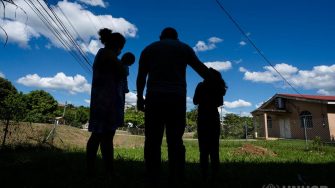
More than 31,000 people have been living in the Australian community for almost a decade in a damaging state of uncertainty. Setting out the case for urgent change, Temporary Protection Visas in Australia: A reform proposal is a new Kaldor Centre policy brief that details how Australia can lawfully move the so-called ‘legacy caseload’ from limbo to permanency.
The Albanese government has committed to ending temporary protection. At this pivotal moment, the Kaldor Centre policy brief maps the way, with a package of 17 inter-related measures that would resolve the legal status of people in the ‘legacy caseload’ so they can settle and give back to Australia.
Since arriving by boat to seek asylum in 2012-2014, most of this group have been found to be refugees and granted a Temporary Protection Visa (TPV) or a five-year Safe Haven Enterprise Visa (SHEV), which allow them to work but not to reunite with family or travel freely. The rest live on precarious short-term bridging visas, some without the right to work and many without access to income support. All face heightened risks of damage to their mental health and well-being.
The Kaldor Centre policy brief sets out the evidence showing Australia’s temporary protection system is unfair, expensive, impractical, and inconsistent with our international obligations. Co-authors Murdoch University Associate Professor Mary Anne Kenny, University of South Australia Professor Nicholas Procter and Emeritus Professor Carol Grech note that requiring refugees to re-apply for protection every few years is not only traumatic for them, but it will also cost taxpayers hundreds of millions of dollars.
The Kaldor Centre’s practical reforms can be implemented relatively simply and swiftly, within existing legislative provisions and with only minimal changes to policy and regulations. Produced in consultation with refugees and asylum seekers living on temporary protection visas and bridging visas, civil society, and legal groups working with refugees, the recommendations would ensure a strategy to help reduce mental distress and re-traumatisation for people in this group and support them to flourish in the community.
‘With a permanent visa, people in the “legacy caseload” would no longer be held back. They could qualify for Commonwealth supported places at university, they would have better job prospects, could take out business loans or mortgages, and feel like they belong,’ says Associate Professor Mary Anne Kenny.
‘Most importantly, they would be able to see their family abroad, and under our recommendations, their applications for family members to join them in Australia would be prioritised,’ she says.
‘These reforms enable everyone to move forward – the Australian community and people in the “legacy caseload”, who could finally begin to live full lives in the community they’ve been part of for so long.’
Key recommendations:
- Refugees on TPVs and SHEVs should be moved onto permanent visas. People who have not yet been assessed or who have previously been refused protection should also be able to apply for a permanent visa that does not require another assessment of their protection claims.
- Trauma and rejection have featured strongly in the lives of many refugees and asylum seekers. As such, a trauma-informed strategy is important to reduce mental distress and deterioration among this group of asylum seekers. The policy brief recommends provision of legal, social and mental health services and support both before and after permanent visas are granted.
- Travel is essential for re-establishing links to separated family. The policy brief recommends removing the restrictions on travel for TPV- and SHEV-holders pending the grant of a permanent visa and includes specific recommendations in relation to travel documents.
- The granting of permanent visas allows individuals to begin the process of family reunion through the family or humanitarian programs. The policy brief recommends removing current policies that relegate sponsors who arrived in Australia by boat or who hold Resolution of Status Visas to the ‘lowest processing priority’.
- Prolonged family separation means that family reunion should be prioritised. The policy brief recommends the establishment of a specialised team within the Department of Home Affairs to work closely with relevant migration agent/lawyer peak bodies, community legal centres, and refugee communities to identify priority actions to manage and progress visas for family overseas and to also identify policy and legislative reform options for close relatives and children who may not fall within the current definition of ‘member of a family unit’.
Read the Kaldor Centre Policy Brief ‘Temporary Protection Visas in Australia: A reform proposal’.
Explore a range of our resources about temporary protection and its impacts on individuals.
Image credit: Tito Herrera/UNHCR
